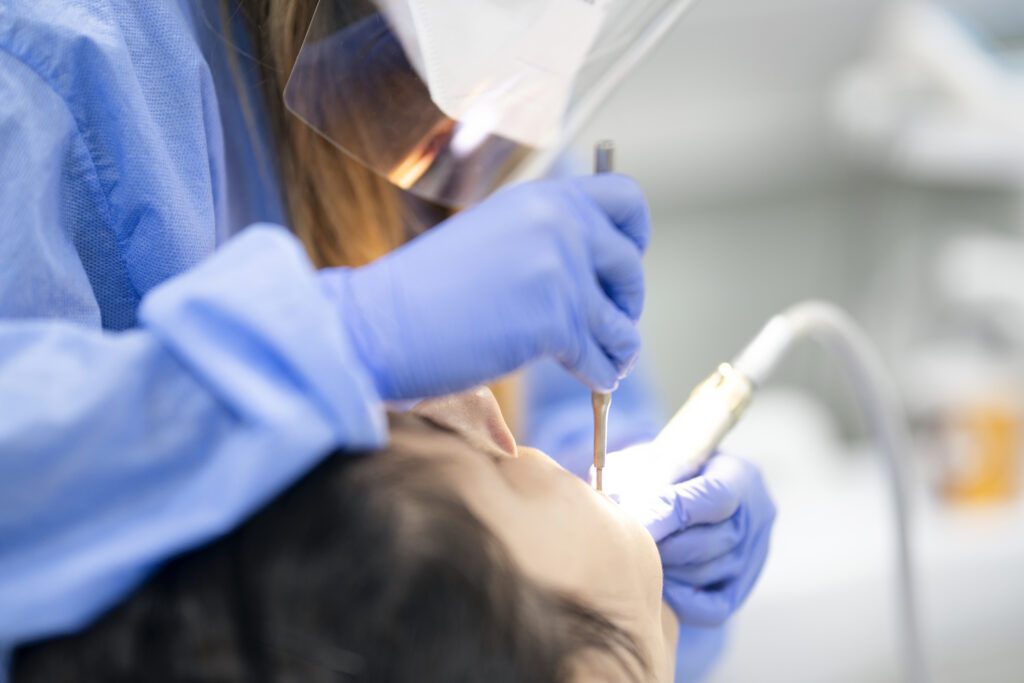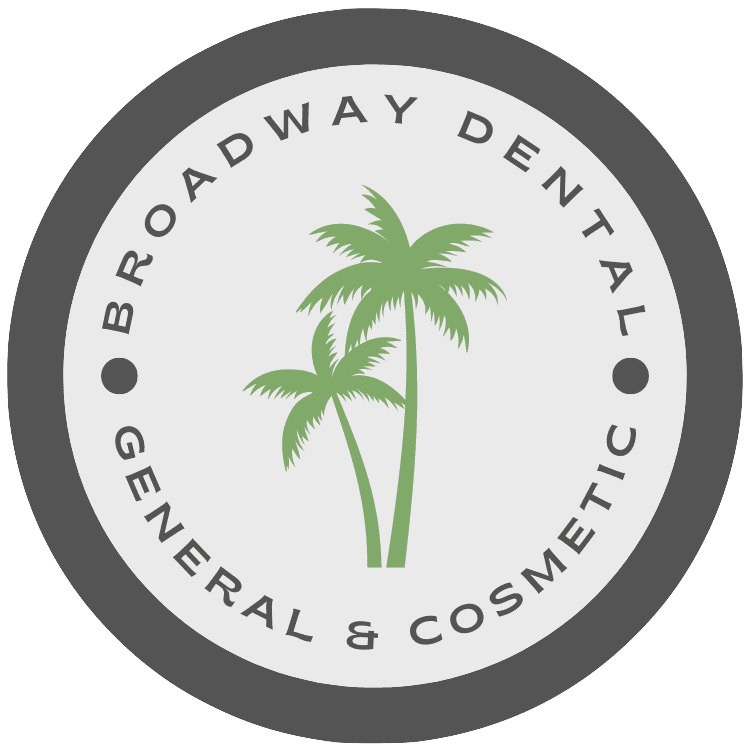Dental lasers are valuable dental tools we use to gently cut or contour the soft tissues of the mouth. Lasers use light and heat to offer minimally invasive care. We offer laser dentistry at Broadway Dental in Galveston, TX, to help patients maintain their oral health and the comfort of their smiles. Our office also uses dental lasers to provide restorative and general dental services to patients in Galveston.
How Lasers Work in Dentistry
Lasers emit energy in the form of light. The dentist can adjust this to target specific areas inside your mouth. This laser precision allows your dentist to perform procedures with very little impact on surrounding areas. You will experience less trauma and quicker recovery times. The ability to selectively treat affected tissues makes laser dentistry a highly effective option for various dental issues.

Laser Dentistry Treatments in Galveston, TX
We can use a dental laser to perform these treatments:
Crown Lengthening
It is no secret that dentists commit themselves to saving teeth. This is why we fill a cavity instead of pulling the tooth. Cavities can decay to teeth where restoration is virtually impossible without crown lengthening. Crown lengthening is a routine surgical procedure that remodels the contour of the gum line.
The procedure does not lengthen the crown but rather lowers the gum line. This is the only option when tooth structure is insufficient to affix a crown. Sometimes, a tooth has been broken below the gum line. In this instance, crown lengthening successfully exposes more of the tooth so that the dentist has something to work with.
Frenectomy
A frenulum is a piece of tissue that prevents an organ from moving. This tissue attaches your upper lip to the gums, while another connects the lower lip to the gums. A too short or thick frenulum will cause problems in speech patterns and tooth misalignment.
In infants, a shortened frenulum underneath the tongue will inhibit breastfeeding. Corrective action is necessary to resolve the situation when the frenulum disrupts movement, growth, or development.
A frenectomy is a minor surgical procedure a dentist performs in your dentist’s office. The dentist can perform with either a scalpel or laser, and it takes less than 15 minutes. Using a laser causes very little bleeding and does not require stitches. A laser also results in less postoperative discomfort and a shorter healing time.
We usually put young children and infants under general anesthesia for the procedure. Dentists also perform the procedure on adults using local anesthesia. If your child needs a frenectomy, there is nothing to worry about. The procedure is very successful and causes minimal discomfort.
Soft Tissue Graft
An oral surgeon uses a soft tissue graft when a significant amount of gum recession exists in a particular area. Moreover, you can fix slight gum recession with a few changes to your oral hygiene routine to take better care of your teeth and gums.
When the gingiva recedes further, it exposes you to a greater risk of infection and bacterial penetration. You will likely be more sensitive to hot and cold foods when you have receding gums.
If the gums recede enough to expose the root, you can set yourself up for more serious problems. The root is softer than the enamel making it more vulnerable to bacteria and plaque.
We can perform a soft tissue graft to restore proper gum level and functionality. Our dentists can do this by either removing soft tissue from the roof of the mouth or repositioning healthy gum tissue from adjacent teeth. This procedure is very predictable and has a high success rate. A dentist should perform this procedure before more serious problems develop and periodontal surgery is necessary.
Benefits of Laser Dentistry
Laser dentistry patients can expect many benefits that enhance their dental experience. Some of the most notable benefits are:
Less Discomfort
One of the best aspects of laser dentistry is reduced discomfort during treatment. Most traditional dental treatments use drills that are distracting and anxiety-inducing. On the other hand, laser treatments are less invasive and typically less painful. Many patients will not need anesthesia or only minimal anesthesia when getting laser treatments, which leads to a better overall experience.
Preservation of Healthy Tissue
Laser dentistry is non-invasive. This means that dentists are able to treat only the damaged tissues and not touch healthy ones. Therefore, the patient experiences less trauma to his or her gums and teeth, leading to full oral well-being and little recovery time.
Faster Recovery Times
With less swelling and bleeding, patients getting laser dental procedures recover faster. Precision in lasers minimizes damage to the surrounding tissues, which makes the recovery process easier. Many patients can quickly return to their daily activities once they have completed their procedures, which is one of the most significant advantages compared to traditional practices.
Improved Sterilization
Laser have the ability to sterilize the area that they are treating as they work. This is a great benefit to patients with gum disease because it removes the harmful bacteria and avoids infection. The sterilizing effect of lasers helps to achieve healthier oral hygiene and is a reason for more long-term success.
Less Anxiety
Dental anxiety is common in patients, and traditional treatments may increase these anxieties. The calming nature of laser dentistry, as well as its decreased discomfort level, can help decrease anxiety. Patients are generally more at ease when they know they are receiving a newer, less invasive procedure, which can lead to a better dental experience.
Laser Dentistry FAQs
Laser dentistry is a revolutionary modern dental technique. Learn more by reading the answers to these commonly asked questions.
Is laser dentistry safe?
Yes, laser dentistry is safe when performed by a trained dental professional. Protective eyewear is used during the procedure to shield patients from laser light. The precision of lasers reduces the risk of damage to surrounding tissues.
Does laser dentistry hurt?
Laser dentistry is generally less painful than traditional methods. Many procedures can be completed without anesthesia, as lasers cause minimal discomfort. Patients often report feeling only mild pressure or warmth during treatment.
How long do laser dentistry procedures take?
Laser procedures are typically faster than traditional methods because they often eliminate the need for anesthesia and reduce the number of required appointments. The exact time depends on the complexity of the procedure.
What is the recovery time after laser dental treatment?
Recovery time is generally faster with laser dentistry than with traditional methods. Soft tissue procedures, for example, often involve minimal swelling or discomfort, allowing patients to return to normal activities quickly. Proper aftercare ensures optimal healing.
Does laser dentistry reduce dental anxiety?
Yes, many patients with dental anxiety prefer laser dentistry because it eliminates the need for noisy drills and reduces discomfort. The precision and gentler approach make procedures more pleasant for anxious individuals.
How does laser dentistry treat gum disease?
Lasers remove infected tissue and bacteria from gum pockets without cutting the gums. This promotes faster healing and encourages the reattachment of healthy gum tissue to the teeth. The precision of lasers helps preserve healthy tissues.
Do dental lasers kill bacteria in the mouth?
Yes, laser dentistry can kill bacteria in the mouth. During laser bacterial reduction, a special laser light is aimed at the gums and teeth to kill harmful bacteria that cause gum disease and inflammation. This method helps reduce bacteria that regular cleaning might miss. It also lowers the chance of infection and helps gums heal faster without pain or bleeding. Laser treatment is quick, safe, and often used during routine dental cleanings to keep your mouth healthy.
Can laser treatments stimulate tissue regeneration?
Yes, laser treatments can help tissues heal and grow back. When lasers target the damaged tissues, they boost the body’s natural healing process. The laser light gives cells more energy to repair themselves, increases blood flow to bring nutrients to the area, reduces swelling, and helps make collagen. Laser dental treatments work for many types of dental issues without the need for surgery
Receive Comfortable Care
Call Broadway Dental for modern dental treatment at 409-765-7500. You can also request a dental appointment with us online.
